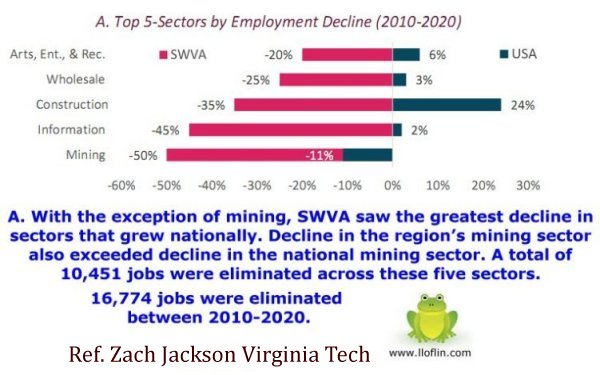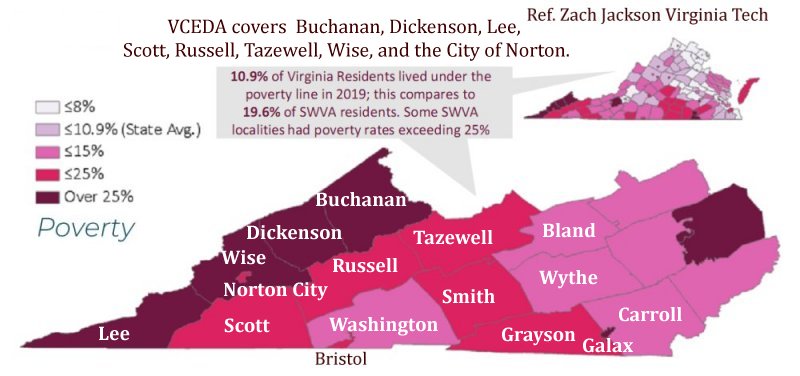

Southwest Virginia Job Losses 2010-2020
By Lewis Loflin
Southwest Virginia’s persistent poverty is no accident—it’s the predictable outcome of crony capitalism and misguided political priorities. I first highlighted these issues around 2010, and time has only validated those concerns. The region faces three intertwined challenges: low literacy rates, national economic policies that undermine labor, and a local political system riddled with dysfunction.
National trends have tilted heavily against workers. In Southwest Virginia, approximately 24% of jobs are in the low-paying retail and service sectors, according to some estimates. Meanwhile, a 2018 United Way report found that 51% of the region’s population earns insufficient income for a decent standard of living. This reliance on unstable, poorly compensated employment—often propped up by corporate welfare masquerading as "small business" support—stifles economic vitality.
Efforts to spur growth have repeatedly fallen short. A robust, government-funded fiber-optic network promised an economic renaissance, yet the anticipated boom never arrived. Similarly, a $2.2 billion state IT contractor in Russell County, bolstered by a $9 million local incentive package, was touted as a game-changer. Instead, the promised 1,000 high-tech jobs shrank to fewer than 20, with many positions reportedly outsourced to India—an ironic twist given the involvement of a firm specializing in such outsourcing. For more details, see How CGI-AMS and Northrop Grumman Failed Russell County.
Call centers, another darling of economic developers, exemplify this hollow promise. Subsidized heavily with public funds, they offer temporary, low-wage jobs that vanish when companies relocate—often within years. From 2010 to 2020, employment in information-related sectors dropped by 45%, despite tens of millions in public investment. Tourism, too, has disappointed: a $20 million "Artisan" center in Abingdon, funded as part of a broader tourism push, has yielded little in over a decade, with plans for another $2 million injection in 2022 underscoring the pattern of waste.
These failures reveal a troubling truth: government subsidies often partner with businesses to destroy jobs and depress wages, not create opportunity.

Pork-Barrel Waste and Corporate Socialism
Working families in Southwest Virginia rely on earned income, not investments, yet they’re increasingly dependent on transfer payments and government jobs—a dependency exacerbated by the decline of mining, construction, and manufacturing. This economic void fuels social issues, from transportation to childcare, while empowering low-wage employers to exploit their workforce. Local chambers of commerce, alongside county economic developers, prioritize protecting existing businesses—often through suppressing unions, overusing temp agencies, and opposing worker protections—over fostering genuine growth.
Washington County, where I reside, defines economic development as "strengthening the community’s economic base" by attracting external funds, not necessarily fostering growth. Yet, examples abound of misdirected resources: a $100 million incentive for a shopping center anchored by a now-defunct sporting goods store, a $20 million-plus package for a failing coal company, and a $6 million lure for a grocery chain to shift offices within the same town. These decisions, rooted in political favoritism, drain public coffers while delivering little public benefit.

Poverty Rates in Southwest Virginia

Reading Levels for Adults 16-74
Low literacy rates compound these woes. In November 2022, local leaders hyped nuclear power plants as a lifeline for unemployed coal miners, claiming they could transition into the industry. This notion collapses under scrutiny: beyond temporary construction or janitorial roles, such jobs demand advanced technical skills unattainable with the region’s educational deficits. The real aim, as reported by WJHL on November 7, 2022, appears to be funneling $10 million in grants to connected insiders—a pattern of waste spanning decades.
Southwest Virginia mirrors West Virginia demographically—90% white—with adequate schools and colleges. Yet, it hemorrhages talent. Graduates flee a business culture offering half the IT wages of other Virginia regions, often subsidized to maintain this disparity. This exodus, paired with an influx of subsidized low-wage employers, traps the region in a cycle of stagnation.
Criticism alone isn’t enough—solutions are overdue. After discussions with a regional economic developer, I propose redirecting funds from tourism, Tobacco grants, and other pork-barrel projects into a general education fund. This isn’t welfare; it’s an investment in human capital. The focus must be voluntary, rigorous education—high school-level math, applied science, and English—for residents of all incomes, provided they’re in or seeking work.
Using existing public institutions like high schools and community colleges, the fund would cover tuition and books, with continued support contingent on passing courses. Failure means expulsion—no freeloading. I’ve taught at a community college and seen adults struggle with basic decimals; without foundational skills, job training is futile. Employers committing to hire graduates at $5 above minimum wage (not the current $2 average) for a year, without temp workers or illegal labor, could receive tax breaks—paid after, not before.
Additionally, a relocation fund could help residents leave for better opportunities, rather than languishing on welfare. It’s time to end corporate socialism: halt subsidies to private entities, dismantle non-profits profiting off poverty, and demand businesses stand on their own. Residents must choose—work, relocate, or face the consequences. Taxpayers owe failing enterprises nothing.
Acknowledgment: I’d like to thank Grok, an AI by xAI, for helping me draft and refine this article. The final edits and perspective are my own.